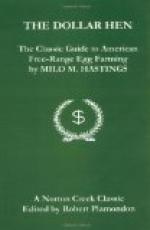This merchant receives weekly quotations from a number of surrounding egg dealers and at intervals of from two days to two weeks, ships to such a dealer, by local freight. The dealer buys the eggs case count, that is, he pays for them by the case regardless of quality. He then repacks the eggs in new cases and, with the exception of a period in the early spring, candles them.
This dealer, in turn, receives quotations from city egg houses and sells to them by wire. He usually ships in carload lots. The city receiver may also be a jobber who sells to grocers, or he may sell the car outright to a jobbing house. The jobber re-candles the eggs, sorting them into a number of grades, which are sold to various classes of trade. The last link in the chain is the housewife, who by ’phone or personal call, asks for “a dozen nice fresh eggs.”
This most frequently repeated story of the American egg applies particularly in the case of eggs produced west of the Mississippi and marketed in the very large cities of the East.
We will now discuss the various steps of the egg trade, pointing out the reason for the existence of the present methods and their influence upon quality and consequent value.
The Country Merchant.
The country merchant is the logical business link between the farmer and the outside world and usually continues to act as the farmers’ buyer and seller until the commodity dealt in becomes of such importance as to demand more specialized form of marketing. Eggs being a perishable crop continuously produced, must be marketed at frequent intervals, and the trips to the general store, necessary to supply the household needs, offers the only convenient opportunity for such marketing.
The merchant buys eggs because by doing so he can control his selling trade.
The farmer trades where he sells his eggs, because it is convenient to do both errands at one place, and also because he wishes to avoid affronting the merchant by breaking the established custom of trading out the amount.
For these reasons the merchant knows that to buy eggs means to sell goods, and he therefore bids for eggs. His competitors across the street, and in other towns, also bid for eggs. The effect to the merchant of lowering the price of his goods or raising the price of eggs is financially the same. In either case it is the matter of cutting the prices under the spur of competition. Now, the articles on which the merchant make his chief profits from the farmers’ trade are dry goods and notions. Such articles are not standardized, but vary in a manner quite impossible of estimation by the unsophisticated. On the other hand, eggs are quoted by the dozen, and all that run may read.




